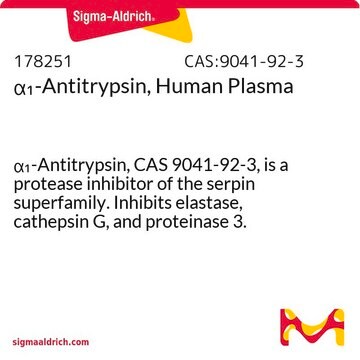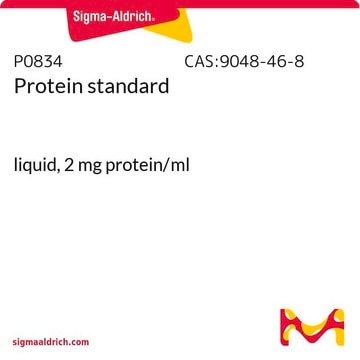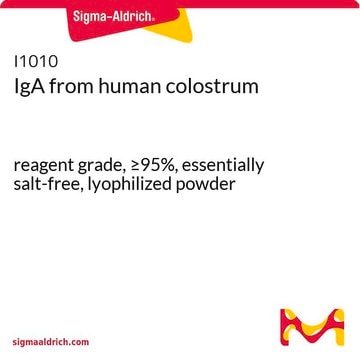A9024
α1-Antitrypsin from human plasma
salt-free, lyophilized powder
Synonym(s):
α1-Proteinase inhibitor
Sign Into View Organizational & Contract Pricing
All Photos(1)
About This Item
Recommended Products
biological source
human plasma
Quality Level
Assay
≥70% protein basis (biuret)
form
salt-free, lyophilized powder
storage temp.
2-8°C
Gene Information
human ... ELA2(1991) , SERPINA1(5265)
Looking for similar products? Visit Product Comparison Guide
Biochem/physiol Actions
Serine protease inhibitor; inhibits trypsin, chymotrypsin and pancreatic and granulocytic elastase, and acrosin. Effective concentration equimolar with proteinase.The effects of hereditary α1-antitrypsin deficiency and certain autoimmune states result from uncontrolled proteolysis in vivo. Direct α1-antitrypsin replacement therapy has shown promise in animal models of Type 1 diabetes.
1-4 mg will inhibit 1.0 mg of trypsin with activity of approx. 10,000 BAEE units per mg protein. 1-6 mg will inhibit 1.0 mg of α-chymotrypsin with activity of >=40 BTEE units per mg protein.
Caution
Aqueous stock solutions containing 0.01% NaN3 are stable for several months. Solutions can be stored at −80 °C, but should not be refrozen. Unstable below pH 5.5. Inactivated by some non-serine proteinases and by oxidation of active site methionine residue.
Preparation Note
Chromatographically prepared and partially purified.
Disclaimer
RESEARCH USE ONLY. This product is regulated in France when intended to be used for scientific purposes, including for import and export activities (Article L 1211-1 paragraph 2 of the Public Health Code). The purchaser (i.e. enduser) is required to obtain an import authorization from the France Ministry of Research referred in the Article L1245-5-1 II. of Public Health Code. By ordering this product, you are confirming that you have obtained the proper import authorization.
Storage Class Code
11 - Combustible Solids
WGK
WGK 3
Flash Point(F)
Not applicable
Flash Point(C)
Not applicable
Choose from one of the most recent versions:
Certificates of Analysis (COA)
Lot/Batch Number
Don't see the Right Version?
If you require a particular version, you can look up a specific certificate by the Lot or Batch number.
Already Own This Product?
Find documentation for the products that you have recently purchased in the Document Library.
Customers Also Viewed
B Halliwell et al.
FEBS letters, 213(1), 15-17 (1987-03-09)
Ascorbic acid, at physiological concentrations, can scavenge the myeloperoxidase-derived oxidant hypochlorous acid at rates sufficient to protect alpha 1-antiprotease against inactivation by this molecule. The rapid depletion of ascorbic acid at sites of inflammation, as in the inflamed rheumatoid joint
M Wasil et al.
The Biochemical journal, 243(3), 867-870 (1987-05-01)
Thiourea and dimethylthiourea are powerful scavengers of hydroxyl radicals (.OH), and dimethylthiourea has been used to test the involvement of .OH in several animal models of human disease. It is shown that both thiourea and dimethylthiourea are scavengers of HOCl
O I Aruoma et al.
The Biochemical journal, 264(3), 863-869 (1989-12-15)
Carnosine, homocarnosine and anserine have been proposed to act as antioxidants in vivo. Our studies show that all three compounds are good scavengers of the hydroxyl radical (.OH) but that none of them can react with superoxide radical, hydrogen peroxide
Roy B Lefkowitz et al.
Analytical chemistry, 82(19), 8251-8258 (2010-09-11)
The ability to measure protease activity in the blood is important for the development of future diagnostics and for biomedical research. Presently, protease assays require sample preparation, making them time-consuming, costly, less accurate, and unsuitable for point-of-care (POC) diagnostics. Recently
B M Bany et al.
Biology of reproduction, 47(4), 514-519 (1992-10-01)
The objective of this study was to investigate the uterine uptake of plasma alpha 1-proteinase inhibitor (53,000 Da) and alpha 2-macroglobulin (725,000 Da) from the blood during implantation in the mouse using isotopic methods. The uterine uptake of albumin (67,000
Our team of scientists has experience in all areas of research including Life Science, Material Science, Chemical Synthesis, Chromatography, Analytical and many others.
Contact Technical Service













